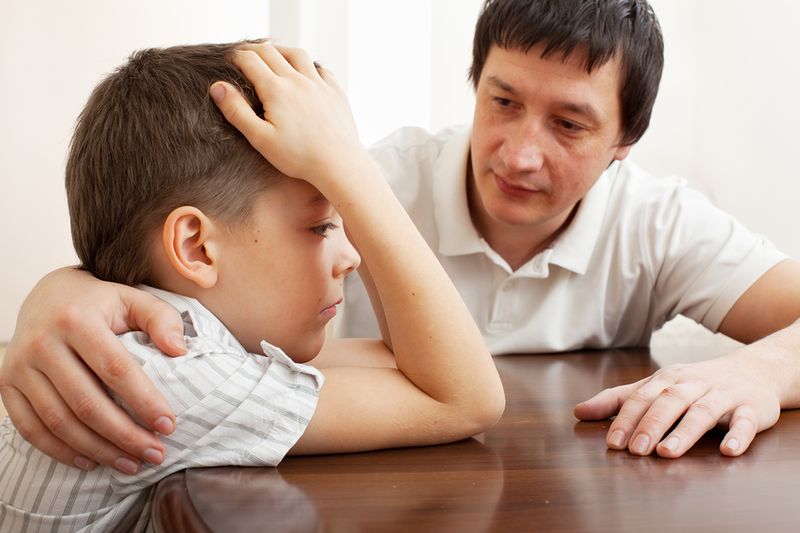Therapists Say These 15 Everyday Phrases Could Be Sending the Wrong Message to Kids

Words carry weight—especially when spoken by a parent. In the heat of daily chaos, it’s easy to fall back on familiar phrases that seem harmless but can quietly chip away at a child’s confidence, curiosity, or emotional resilience. What we say becomes the voice in their head, shaping how they see themselves and the world around them. This list isn’t about judgment—it’s about reflection. By swapping out common but damaging statements for more thoughtful alternatives, you empower your child to thrive emotionally and mentally. Ready to elevate your parenting language? Here are 15 phrases therapists say to retire—for good.
1. “Because I said so.”

This conversation-stopper might end arguments quickly, but it teaches children nothing about reasoning or decision-making. Kids naturally want to understand the world around them, and this phrase dismisses their curiosity.
When parents explain their reasoning, even briefly, children learn how to think through situations logically. They also feel respected and valued when adults take time to help them understand.
Try saying: “We don’t run near the pool because wet surfaces are slippery and you could get hurt” or “We’re leaving now because we promised Grandma we’d visit today.” These simple explanations build trust and communication skills.
2. “Stop crying—it’s no big deal.”

When adults minimize children’s feelings, kids learn to doubt their emotional responses. What seems small to grown-ups might feel enormous to a child whose emotional regulation is still developing.
Acknowledging emotions helps children develop emotional intelligence. When parents validate feelings first, then help children move through them, kids learn healthy coping mechanisms.
Better alternatives include: “I see you’re really upset. Can you tell me what happened?” or “It’s okay to feel sad about your broken toy. Would you like a hug while you feel sad?” These responses teach children their feelings matter.
3. “Why can’t you be more like your sibling?”

Comparing children creates lasting wounds and breeds resentment between siblings. Each child has unique strengths, challenges, and personality traits that deserve recognition and respect.
Children who constantly hear comparisons often develop insecurity or resentment. They may either give up trying to meet impossible standards or develop unhealthy competitive attitudes toward siblings who should be allies.
Instead, recognize each child’s individual journey: “I notice you’re working really hard on your drawing” or “You have such a kind way of talking to your friends.” Celebrate what makes each child special without reference to others.
4. “You always mess up” or “You never listen”

Words like “always” and “never” make children feel permanently labeled as problems. These absolute statements ignore all the times they’ve done things right and focus only on mistakes.
Research shows children internalize these messages deeply. A child repeatedly told they “never listen” may eventually believe it’s simply who they are, rather than a behavior they can change.
Focus on specific incidents instead: “I noticed you forgot to put your dishes away after lunch today” or “I’m speaking to you about this homework assignment, not about every assignment.” This approach addresses behaviors without attacking character.
5. “I told you so.”

These four words might feel satisfying to say when proven right, but they create shame rather than learning. Children already feel vulnerable when things go wrong – adding an “I told you so” rubs salt in the wound.
Kids need safe spaces to make mistakes. When parents focus on being right rather than supporting growth, children become afraid to try new things or admit when they’re struggling.
Supportive alternatives sound like: “That didn’t work out as you hoped. What do you think you might try differently next time?” or “It’s tough when things don’t go as planned. How can I help?” These responses build resilience instead of resentment.
6. “Stop being so dramatic.”

Children experience emotions intensely because their brains are still developing emotional regulation skills. What looks like overreaction to adults feels completely proportional to children.
Labeling emotions as “dramatic” teaches kids to suppress feelings rather than process them healthily. Over time, this can lead to difficulty identifying and expressing emotions appropriately.
Try validating first: “I can see you’re feeling really upset right now” or “Big feelings can be overwhelming sometimes. Let’s take some deep breaths together.” These approaches acknowledge emotions while gently helping children develop regulation skills.
7. “What’s wrong with you?”

This question implies something is fundamentally broken about the child rather than addressing a specific behavior. Children hear this as criticism of their core identity, not their actions.
Kids who repeatedly hear this question often develop shame-based thinking patterns. They begin to believe something truly is wrong with them, damaging their self-concept and confidence.
Curiosity works better than accusation: “I noticed you pushed your sister. What were you feeling just before that happened?” or “I’m wondering what made you decide to draw on the wall today.” These questions seek understanding while maintaining respect for the child.
8. “Wait till your father/mother gets home.”

Threatening children with delayed punishment creates unnecessary anxiety and turns the other parent into the designated “bad guy.” Hours of dread don’t teach better behavior – they just create fear and resentment.
This approach also undermines your own authority as a parent. Children learn you’re not capable of handling situations yourself, which can lead to testing boundaries when only you are present.
Address issues in the moment: “I need you to stop running in the house now. Let’s talk about safer ways to play indoors.” If you genuinely need the other parent’s input, frame it as a family discussion rather than impending punishment.
9. “You’re so lazy.”

Labeling children with negative character traits like “lazy” creates self-fulfilling prophecies. Kids who hear they’re lazy often give up trying because they believe effort won’t change others’ perceptions of them.
Many behaviors adults interpret as laziness actually stem from other issues: feeling overwhelmed, lacking skills, fear of failure, or even learning differences. A child struggling with executive function might appear “lazy” when they’re actually working harder than peers just to get started.
Focus on encouragement: “This project has several steps. Which part would you like to start with?” or “I notice homework feels tough today. Would breaking it into smaller chunks help?” These approaches build confidence and problem-solving skills.
10. “Practice makes perfect.”

While seemingly motivational, this common phrase sets an impossible standard of perfection. Children may interpret this literally and become discouraged when perfection remains elusive despite practice.
The pressure to achieve perfection can trigger anxiety and fear of failure. Many children will avoid activities altogether rather than risk not measuring up to unrealistic standards.
More helpful alternatives include: “Practice helps you improve a little each time” or “I’m proud of how you kept trying even when it was difficult.” These statements celebrate effort and progress rather than demanding flawless results.
11. “Good job!” (when overused)

Generic praise like “good job” becomes meaningless when applied to everything from tying shoes to solving complex math problems. Children stop valuing praise that feels automatic rather than genuine.
Research shows specific feedback helps children develop internal motivation and accurate self-assessment. When praise focuses on process rather than results, children develop growth mindsets and resilience.
Try specific observations: “You spent a long time working on that drawing – I notice all the details you added to the background” or “I saw how you helped your friend when they were sad. That showed real kindness.” These comments help children recognize exactly what they did well.
12. “Don’t talk to strangers.”

This oversimplified safety rule actually leaves children vulnerable. In emergencies, children sometimes need to seek help from people they don’t know, like store employees or police officers.
The concept of “stranger” is also confusing for children. Many abusers aren’t strangers but people known to the family, while most unknown people pose no threat.
More effective safety teaching includes: “Most people are good, but some people might not be safe. If anyone asks you to keep a secret from mom or dad, that’s a warning sign” or “If you get separated from me, find a mom with children or someone who works at the store to help you.” These nuanced approaches build true safety skills.
13. “Be careful.”

This vague warning doesn’t give children actionable information about what dangers exist or how to navigate them safely. Without specific guidance, “be careful” creates anxiety without building actual safety skills.
Children develop confidence through understanding risks and learning appropriate responses. Vague cautions teach fear rather than competence.
Specific safety instructions work better: “Hold the scissors with the points away from your body” or “Walk slowly on these slippery rocks and hold my hand.” These directions teach children how to assess and manage risks independently, preparing them for situations when adults aren’t present to warn them.
14. “I’m disappointed in you.”

This phrase hits children particularly hard because it suggests they’ve damaged their relationship with someone they love. Unlike criticism of specific actions, disappointment feels like rejection of their whole self.
Children desperately want parental approval. When they believe they’ve lost it, they experience deep shame rather than motivation to improve.
Focus on the behavior, not the child: “I felt sad when I saw the broken vase because it was special to me. Next time, please walk instead of run in the house” or “I expect homework to be finished before screen time. How can we make sure that happens tomorrow?” These approaches maintain connection while addressing problems.
15. “You’re fine.”

When children express pain or distress, telling them they’re fine invalidates their experience. Adults can’t feel what children feel, and dismissing their reports teaches them not to trust their own perceptions.
Children whose feelings are routinely dismissed often stop communicating honestly about problems. They learn their experiences don’t matter or won’t be believed.
Acknowledge their experience first: “You bumped your knee pretty hard. Would you like me to look at it?” or “You seem upset about something that happened at school. I’m here to listen whenever you want to talk.” These responses show children their feelings deserve attention and respect.

Comments
Loading…